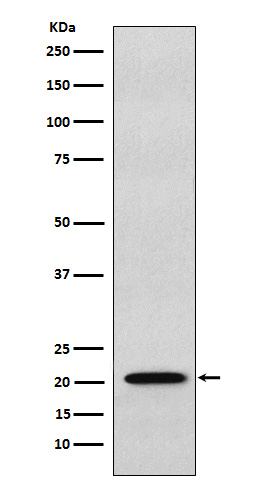
| WB | 咨询技术 | Human,Mouse,Rat |
| IF | 1/20-1/50 | Human,Mouse,Rat |
| IHC | 咨询技术 | Human,Mouse,Rat |
| ICC | 技术咨询 | Human,Mouse,Rat |
| FCM | 1/20-1/100 | Human,Mouse,Rat |
| Elisa | 咨询技术 | Human,Mouse,Rat |
| Aliases | C21KG; G 22K; K REV; KREV 1; KREV; KREV1; RAL1B; RAP 1; RAP 1A; RAP 1B; RAP1; RAP1B; SMGP21;;RAP1A/1B |
| WB Predicted band size | 21 kDa |
| Host/Isotype | Rabbit IgG |
| Antibody Type | Primary antibody |
| Storage | Store at 4°C short term. Aliquot and store at -20°C long term. Avoid freeze/thaw cycles. |
| Species Reactivity | Human,Mouse,Rat |
| Immunogen | A synthesized peptide derived from human RAP1A |
| Formulation | Purified antibody in PBS with 0.05% sodium azide,0.05% BSA and 50% glycerol. |
+ +
以下是关于RAP1A和RAP1B抗体的3篇参考文献的简要总结:
1. **文献名称**:*RAP1 regulates the formation of E-cadherin-based cell-cell contacts*
**作者**:Hogan C, et al.
**摘要**:研究利用RAP1A和RAP1B特异性抗体,通过免疫印迹和免疫荧光分析,揭示了RAP1蛋白在调控上皮细胞间黏附连接中的关键作用,并发现其通过调节E-cadherin分布影响细胞极性。
2. **文献名称**:*Role of RAP1B and its effector proteins in platelet integrin activation*
**作者**:Shattil SJ, et al.
**摘要**:通过抗RAP1B抗体的功能阻断实验,证实RAP1B在血小板整合素αIIbβ3激活中的核心地位,表明其可作为抗血栓治疗的潜在靶点。
3. **文献名称**:*Differential roles of RAP1A and RAP1B in cancer cell migration and invasion*
**作者**:Zhang Z, et al.
**摘要**:采用特异性抗体区分RAP1A和RAP1B的亚细胞定位,发现两者在肿瘤细胞侵袭转移中发挥相反作用,为靶向RAP1亚型的精准治疗提供依据。
RAP1A and RAP1B are closely related small GTPases belonging to the Ras family, sharing ~95% amino acid sequence identity. These proteins function as molecular switches, cycling between active GTP-bound and inactive GDP-bound states to regulate diverse cellular processes, including cell adhesion, migration, proliferation, and differentiation. They play critical roles in integrin-mediated signaling, MAPK/PI3K pathways, and vesicle trafficking. While RAP1A and RAP1B exhibit functional redundancy, studies suggest distinct roles in specific contexts, such as RAP1B's prominence in platelet activation and vascular development.
Antibodies targeting RAP1A+RAP1B are widely used to detect both isoforms simultaneously, given their high homology. These antibodies are valuable tools for studying their combined expression patterns, subcellular localization, and activation status in various physiological and pathological conditions. Validation typically involves knockout cell lines or siRNA-mediated knockdown to confirm specificity. Applications include Western blotting, immunofluorescence, and immunohistochemistry across cancer research (e.g., tumor invasion/metastasis), cardiovascular studies (e.g., angiogenesis), and immunological investigations (e.g., leukocyte adhesion). Researchers must consider potential cross-reactivity with other Ras family members and verify isoform-specific effects through complementary approaches. Commercial antibodies often target conserved regions, with some distinguishing between phosphorylated or GTP-bound active forms.
×